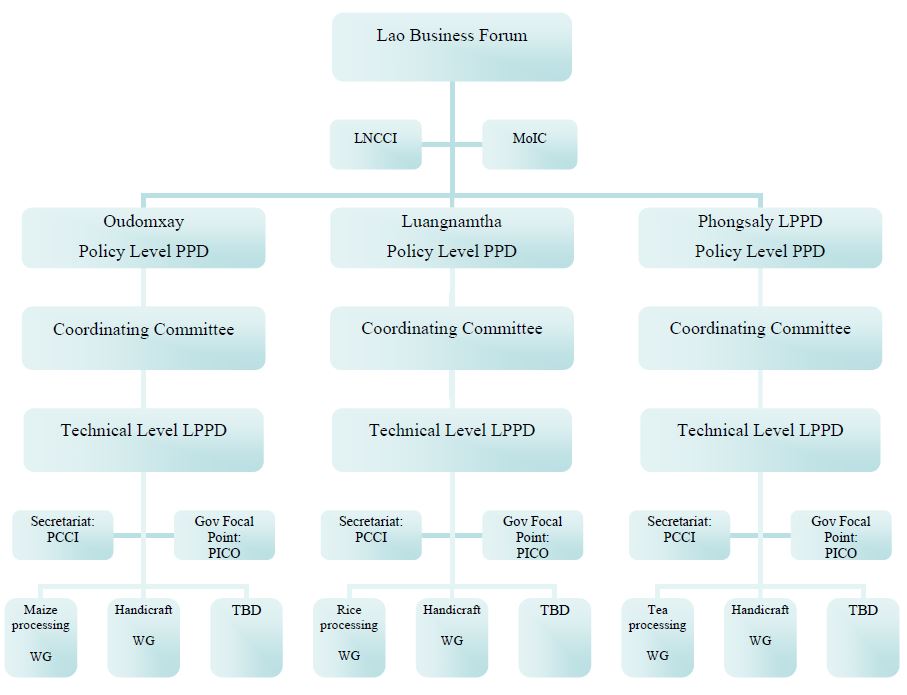About LPPD
Background
With an objective to improve business enabling environment in the country, Lao Business Forum (LBF) was established in late 2005 to provide a structured platform for the business community to engage in a regular, constructive dialogue with the Government. Over the years, LBFs have made significant contributions to resolving concrete issues facing the private sector in the areas of tax administration and trade facilitation. However, in order to ensure a bigger impact at national level and improve its inclusiveness, it is essential that its structured and constructive dialogue process is extended to the provincial level to promote consistent implementation of laws and regulations, and remove barriers that businesses face, regarding business entry and operation, at the local level.
Oudomxay, Luangnamtha and Phongsaly are located in Northern Region of Lao PDR, in which the economy depends heavily on natural resource sectors and commercialization in the agriculture sector. The topography of the three-provinces are highly mountainous, with extremely limited accessibility some mountain villages, making it more difficult for economic development. In recent years, however, large portions of rural land in the three provinces, previously used for subsistence agriculture, have been transformed to large-scale farmlands for commercial crop plantations, led by a few numbers of firms. Nevertheless, high regulatory burden, excessive trade costs, limitation on market access, poor infrastructure and firms’ limited capacity remain the key challenges to private sector-led growth of the three provinces. Recognizing that economic progress depends on a business climate conducive to private investment and enterprise, improving business environment is, therefore, critical for boosting the economy of the three-provinces, especially for improving rural producers’ productivities and expanding their market orientation. In recent years, there has been growing interest in in the potential of dialogue between the public and private sectors to promote the right conditions for private sector development across the countries. Nevertheless, implementation and monitoring of the dialogue process has been facing with many challenges, resulting from:
Discontinuous formal consultations on business issues between public and private sectors, resulting in a lack of mutual trust of the public and private sectors on the dialogue process,
Inadequate capacity of provincial business associations/organization, i.e. provincial chamber of commerce and industry (PCCI), to perform secretariat function of the dialogue.
Inconsistent enforcement and discretionary interpretation of some laws and regulations that could affect business operations.
Limited capacity of the government at the central level and Lao National Chamber of Commerce and Industry (LNCCI) to systematically oversee, prepare and manage a continuous public and private dialogue at the local level.
This project is, therefore, designed to support replicating ongoing national-level public-private dialogue (LBF) in the three target provinces in northern Laos, Oudomxay, Luangnamtha and Phongsaly to provide a platform for local businesses to voice their concerns and issues to local authorities and feed local issues to the national-level dialogue process.
Objective
The prime objective of supporting the Local Public Private Dialogue (LPPD) is to address specific local business environment issues, especially issues related to the inconsistent implementation of laws and regulations at local level, and support the participation and representation of local businesses in local-level policy making and at the National Lao Business Forum.
Main Activities
- Preparation phase: establish dialogue structure (including full time secretariat, private sector working groups, coordinating committee), and endorse work plans;
- Assist provincial chamber of commerce on building their capacity to perform secretariat function for an on-going and sustainable dialogue;
- Support regular dialogue based on agreed structure;
- Support formulation of position papers for priority issues;
- Promote linkage between local level PPD and the LBF;
- Performance M&E; and,
- Carry out impact assessment through business perception surveys


